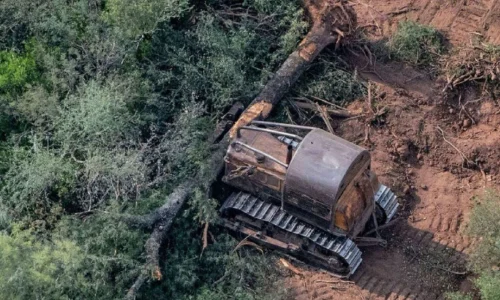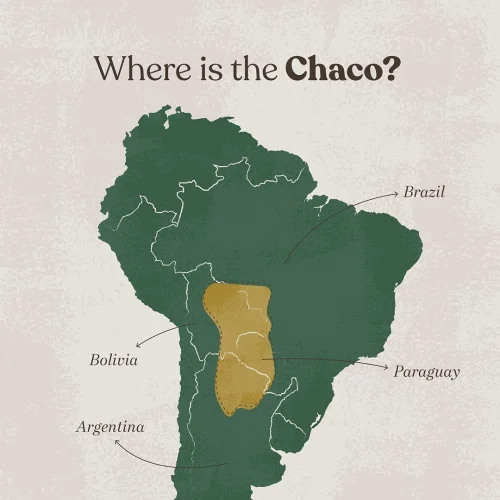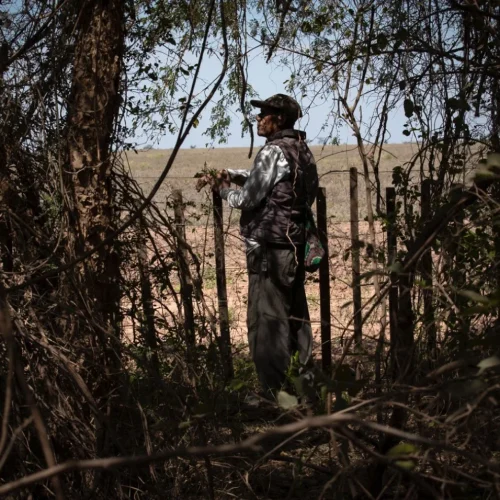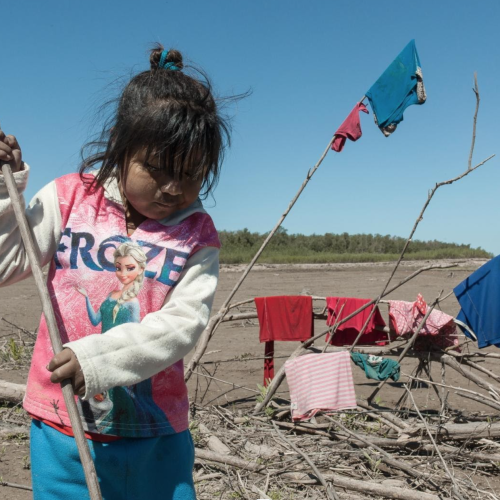About
Gran Chaco
We work to create a network of sanctuaries in the Gran Chaco Ecoregion where the knowledge and cultural traditions of indigenous peoples can thrive in a protected and sustainably managed territory. In this way cultures and biodiversity can once again thrive together.


Why do we need to protect the territories of indigenous communities?
We support the creation of an interconnected network of indigenous communities in the Gran Chaco because we recognise the urgency of protecting biodiversity and cultural diversity in this strategic ecological region.
Indigenous communities are expelled from their traditional territories. Without the forest, they are condemned to live in extreme poverty in the suburbs of the cities.
Cultural diversity is key to humanity and to improving and protecting ecosystems and their biodiversity. The rich cultural heritages of these cultural groups have been severely affected and their knowledge and wisdom is being lost to new generations.
We aim to protect these territories, empowering communities to recover their relationship with the natural world and their territories, securing and collaborating with them in the restoration of native forests and their biodiversity. That is why we set out to promote and create spaces for the preservation of their traditional knowledge and wisdom. As an elder told us some time ago: “Any culture, like any star, no matter how small, is essential to the universe”.
Current situation
The collective territories of indigenous communities in the Argentinean Chaco are being systematically exploited and expropriated. Biodiversity of the ecosystem is collapsing and mostly on the verge of extinction. So are the many indigenous traditions and cultures that inhabited this area for many centuries.
Bulldozers are a common sight in the north of Argentina’s landscape. In the Argentine “Gran Chaco”— South America’s largest forest after the Amazon —, deforestation has eaten away relentlessly at the native forests, including areas that should be protected under the country’s 2007 forest law. The Gran Chaco accounts for 87% of total deforestation in Argentina. About 5 million hectares (12.4 million acres) was destroyed in the first two decades of the 21st century.

Logging within the Gran Chaco, driven by the industries that, just like in the Amazon, seek to acquire land for agricultural and livestock activities has decreased somewhat in recent years, but is far from stopping.
The Argentine Gran Chaco suffers from a wide variety of issues, but deforestation is considered its most severe problem. The risks of its deforestation include the destruction of habitats, changes to the natural characteristics of the soil, alterations in the forest’s hydrological and climatic dynamics, and even the social and economic collapse of communities around the forest (that need the Forest to satisfy basic needs like food or medicinal plants). Current trends suggest that these risks to ecosystems will continue as the agricultural and livestock frontier expands.
“Without forests, there is no wichi...”
Said Juan de Dios Lopez, a member of the Wichi indigenous community in Salta province.
Malnutrition, illness, displacements and environmental disasters are the aboriginal experiences of the advancing agrarian frontier.
Recover a collective ownership of the lands
Alianza Wichi’s main mission consists of supporting indigenous organizations to recover the collective ownership of their lands, and possibly expanding this area to a significant area in Argentina.
We intend to create a network of natural and cultural sanctuaries as a refuge for local cultures and a natural reserve where biodiversity can thrive again.
Collective land ownership is central to the indigenous struggle against deforestation and to social and environmental sustainability. Wichí and more than fifteen other cultural groups (Chorote, Nivacle, Guaraní, Qom, Pilagá, Chané, Mocoví, Weenhayek) of the Argentinean Chaco region struggle for collective land ownership undermines the individualistic mantra of ‘private property’ of capitalist social relations.
Through land acquisition and collective management according to indigenous principles, we believe we can quickly rewild and regenerate lands that have been spoiled by years of extractive agriculture using pesticides.

“Any culture, as any star, no matter how small this is,
becomes essential to the universe”
The plan
We will begin the regeneration process of the community’s territory, exploring the diverse techniques of reforesting the destroyed areas and biodiversity. Using agroforestry techniques, we want to plant edible forests and bio intensive crops, as well as recovering medicinal plants. Other projects will be launched in the benefit of all communities such as: a seed bank of endangered specimens, a tree nursery, drinking water supply or crop irrigation.

By supporting Alianza Wichi, you join a global community of solidarity who believe Culture and Nature can thrive together. But above all, you will participate in the active regeneration of the Gran Chaco Region, a key Ecoregion in the heart of Latin America.
